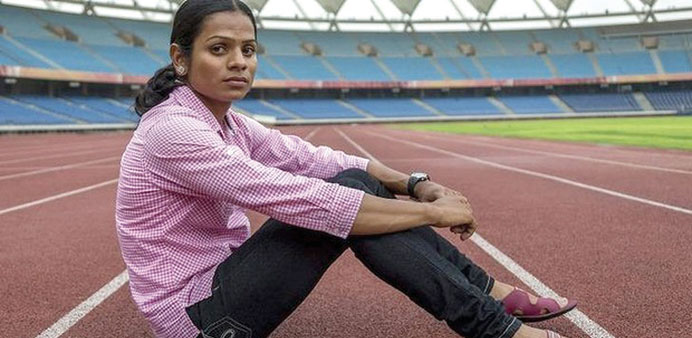AFP/New Delhi
Indian sprinter Dutee Chand, at the centre of a gender controversy, has been cleared to compete for the next two years after a ruling by the Court of Arbitration for Sport (CAS) yesterday.
CAS decided that they would wait for more clarification from governing body the International Association of Athletics Federations (IAAF) about Chand’s hyperandrogenism before taking any further steps.
Chand, India’s under-18 100 metres champion, was diagnosed with hyperandrogenism, a condition which produces high testosterone levels and meant she fell foul of IAAF gender rules.
Chand, the daughter of weavers who was brought up in rural poverty, had her promising career turned upside down when she was barred from last year’s Commonwealth Games in Glasgow after showing elevated levels of testosterone.
However, CAS has asked the IAAF to provide more scientific evidence about the quantitative relationship between enhanced testosterone levels and improved athletic performance in hyperandrogenic athletes.
During that time Chand, the first athlete to challenge the rules, will be able to compete.
“The CAS Panel in charge of the procedure has suspended the ‘IAAF Regulation Governing Eligibility of Females with Hyperandrogenism to Compete in Women’s Competition’ (the “Hyperandrogenism Regulations”) for a maximum period of two years,” read the CAS statement.
Because of the lack of evidence, “the CAS Panel was unable to conclude that hyperandrogenic female athletes may benefit from such a significant performance advantage that it is necessary to exclude them from competing in the female category.
“While the Hyperandrogenism Regulations are suspended, Ms Dutee Chand is permitted to compete in both national and international level athletics events.
“Should the IAAF not file any scientific evidence within the two-year period granted by the CAS Panel, the Hyperandrogenism Regulations will be declared void.”
The Hyerpandrogenism Regulations were introduced after the IAAF’s struggles with the case of South African runner Caster Semenya, the 2009 outdoor world 800 metres women’s world champion, who was banned but later reinstated following investigations into her gender.
The rules are intended to stop women competing with high levels of testosterone, which is known to increase strength and muscle mass.
But critics have challenged the science involved, saying the link between testosterone and performance is unclear, and that testing is arbitrary and psychologically damaging.
The IAAF noted the CAS ruling although it also took heart from some of the observations.
“The IAAF is happy to note that the CAS Panel in its interim award specifically found that the IAAF and its experts have ‘acted with conspicuous diligence and good faith’, seeking ‘to create a system of rules that are fair, objective and founded on the best available science’, and that those rules ‘have been administered in confidence and with care and compassion’ (including ensuring that athletes affected have received the medical treatment required to ensure their wellbeing).
“The IAAF is also happy to note the CAS Panel’s ruling that there is a sound scientific basis to the Regulations, in that endogenous testosterone is ‘the best indicator of performance differences between male and female athletes’, and its acceptance that hyperandrogenic female athletes may have a competitive advantage over athletes with testosterone levels in the normal female range.”
The statement added that it would address the issues raised by the ruling.
“The IAAF will now meet as soon as possible with its experts and with the IOC and its experts to discuss how best to address this interim ruling by the CAS,” read their statement.
“The IAAF will make no further comments on this subject until those discussions are concluded.”
Chand had told AFP in October last year the trauma she had suffered.
“I was told I must undergo surgery or take hormonal treatment if I wanted to salvage my career. I was stunned to hear all this,” Chand said.
“It’s so cruel. God has made me the way I am. I don’t want to change anything and I also don’t want to give up sports.”

Reprieve: India’s Dutee Chand
